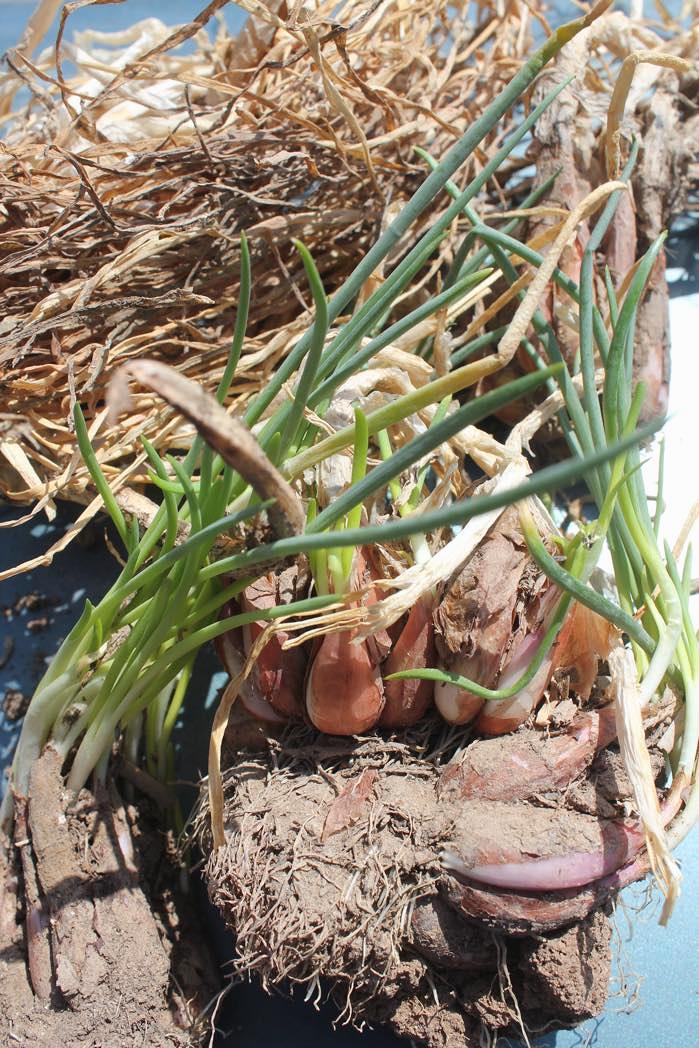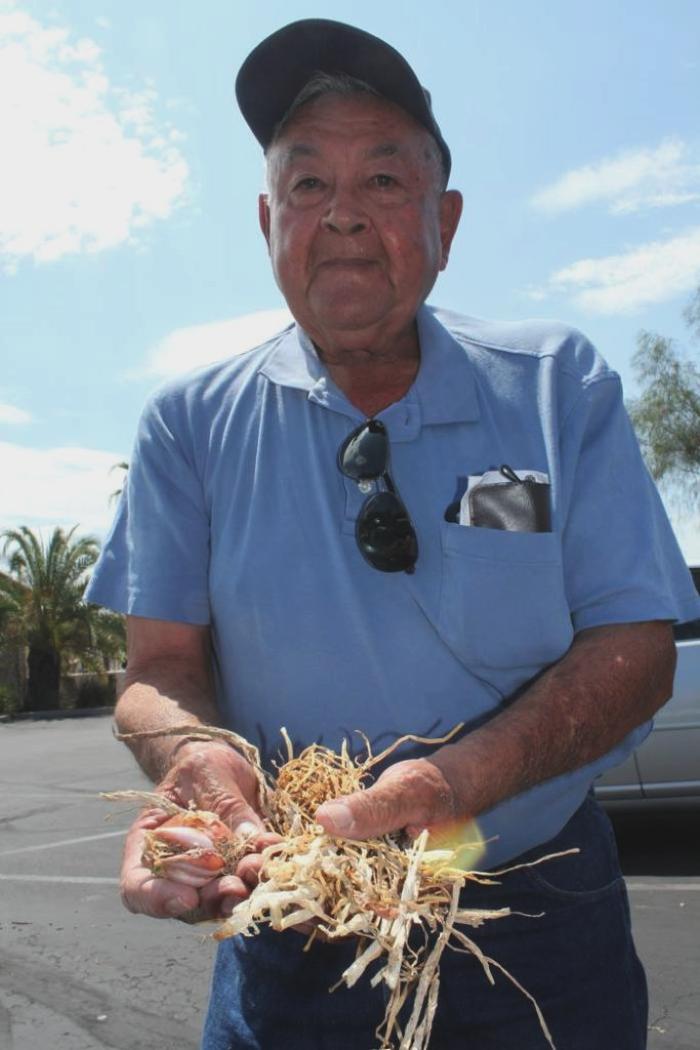 |
Canku Ota
|
 |
|
(Many Paths)
|
||
|
An Online Newsletter
Celebrating Native America
|
||
|
September 2017 - Volume
15 Number 9
|
||
|
|
||
|
Preserving Traditional
Crops: The Tohono O'odham I'itoi Onion
|
||
|
by Lee Allen - Indian
Country Today
|
||
|
The precursor
to today's shallot, these traditional crops are tasty in salsa and
scones
There are two origin stories, the standard line being that the I'itoi onion came from some bunching or multiplying onions brought to the New World by missionaries from Spain in 1699 and traded for O'odham tepary beans. This precursor to the cultivated shallots grown today got its name from the creator deity of the desert people. "According to legend," said regional farmer and agricultural consultant Bob Sotomayor (Yaqui), "One day, I'itoi (Creator of the O'odham) gathered his people and gave them onions as a gift to be planted and shared with all." Regardless of historical background, the I'itoi was made for desert cultivation because of its love of a dry climate. It's a fast-dividing multiplier that grows a shallot or chive-like top to go with the bulb bottom that has a peppery bite. Bulbs are multipliers (Allium cepa), which means they propagate themselves by division underground rather than from top-setting bulbils. Mature bulbs are relatively small, about the size of hefty garlic cloves. The largest year-round producer of I'itoi onions in the state is Crooked Sky Farms, organic, non-GMO growers on 400-plus acres at several sites around the metro Phoenix area that last year produced over two million onions. Owner Frank Martin (Cherokee) came from a family where his migrant farmworker father had instilled the tradition of using heirloom seeds, caring for the soil, rotating crops and other sustainable farming practices as part of stewardship of the land. Martin's onion patch began a decade or so ago when a friend discovered a handful of desiccated and shriveled onion bulbs. "Four looked promising, so I planted them and one became two, two became four, and today I have millions. As long as you stick some back in the ground when you harvest, you'll have onions for the rest of your life." On the Tohono O'odham San Xavier Co-op Farm outside Tucson, Native growers continue to grow this traditional crop on 850-acres farmed by more than 1,000 tribal plot owners. Sotomayor, who offers agronomy and horticultural advice there, said: "If you store the bulbs in a cool, dry place, at the proper time, they'll begin to sprout small green shoots, a signal that it's planting time. If you plant a small clump, say a 2-inch bunch, it will quadruple in size in short order, especially if you plant in well-cared-for fertile soil as they're heavy feeders like all members of the onion family. "If your soil is good and you furnish the water they need, you'll get green shoots in excess of a foot and a half tall. While you can eat both the bulbs and the greens, don't eat all the greenery because the photosynthesis process needs the shoots to make the bulbs."
While it may be a tedious process to peel the fully-matured bulbs, Sotomayor said it's worth the effort for the mild, sweet, aromatic quality that goes well in salsa and a number of other recipes. The Tohono O'odham San Xavier Co-op Farm maintains a specific plot for I'itoi onions to preserve that particular traditional food. "Smart idea," Sotomayor said. "Regular green onions are grown from seed, which can be expensive. And at some point, somebody will probably say, 'let's go GMO' with the onions found on grocery store shelves. Because the I'itoi has no seeds to go GMO, it will remain a traditional crop as other tribes begin to adopt it as their common garden onion."
I'itoi Onion and Goat Cheese
Scones
Preheat oven to 375 degrees Mix flour, baking powder, baking soda, and sea salt in large bowl. Add onions and cheese. Beat the egg and milk in a smaller bowl and stir the mixture into the dry ingredients, mixing gently until dough forms. Knead the dough until firm, then divide it in half. On a lightly floured surface, flatten pieces into ¾-inch thick rounds, then cut each round into six wedges. Bake scones until the tops are golden (about 25 minutes).
San
Xavier Co-op Farm |
||||||||||||||||||||||
|
|
|
|
||
|
|
||
| Canku Ota is a free Newsletter celebrating Native America, its traditions and accomplishments . We do not provide subscriber or visitor names to anyone. Some articles presented in Canku Ota may contain copyright material. We have received appropriate permissions for republishing any articles. Material appearing here is distributed without profit or monetary gain to those who have expressed an interest. This is in accordance with Title 17 U.S.C. Section 107. | ||
|
Canku Ota is a copyright ©
2000 - 2017 of Vicki Williams Barry and Paul Barry.
|
||
 |
 |
|
|
The "Canku
Ota - A Newsletter Celebrating Native America" web site and
its design is the
|
||
|
Copyright ©
1999 - 2017 of Paul C. Barry.
|
||
|
All Rights Reserved.
|
||

